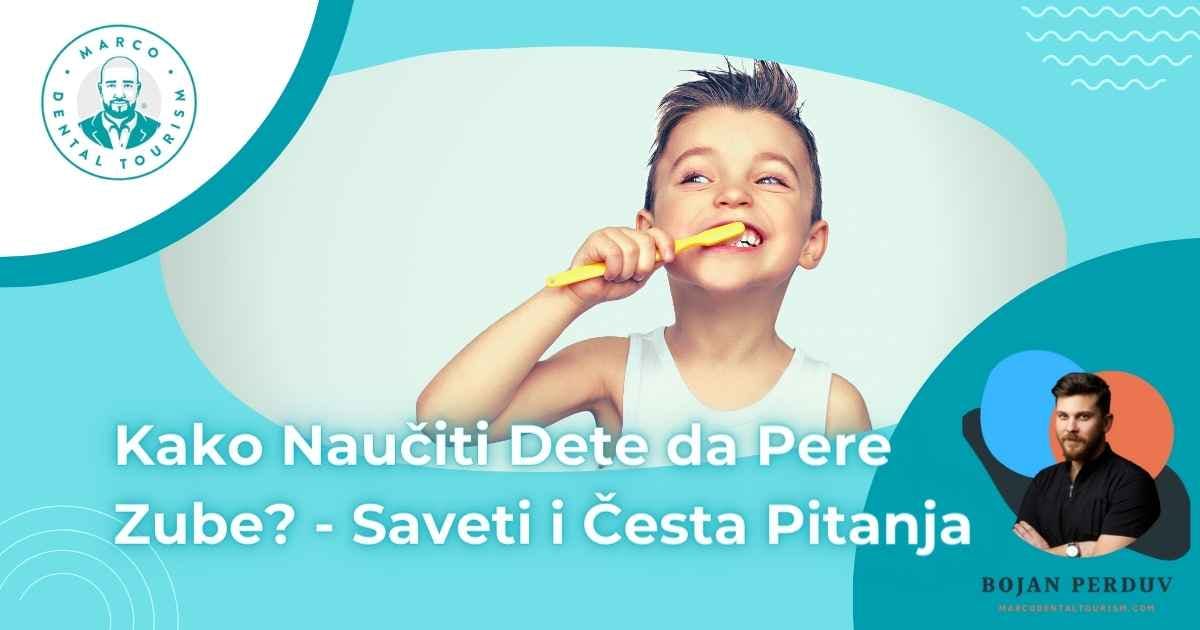How to Teach a Child to Brush His Teeth: Tips and Frequently Asked Questions

Do you constantly have to remind your child to brush their teeth? Children often do not understand why daily brushing is so important for their health. That is why in this blog we deal with practical advice as well as answers to frequently asked questions about how to teach a child to brush his teeth effectively and enthusiastically.
Why is it important to properly brush children's teeth?

Proper tooth brushing in childhood is important for maintaining good oral hygiene, preventing caries and gum disease, and for establishing healthy lifestyle habits. Regular tooth brushing removes harmful bacteria, prevents bad breath and makes children's teeth resistant to many dental problems.
What are the benefits of regular tooth brushing in children?

Regular oral hygiene in children helps prevent caries, gum disease and bad breath. Brushing your teeth encourages healthy habits and can reduce the risk of needing more complicated dental procedures later in life. It is recommended for children to brush their teeth twice a day for two minutes.
What are the consequences of irregular tooth brushing in children?

Irregular tooth brushing in children can lead to various consequences such as tooth decay, gum disease, bad breath, and even tooth loss. Daily brushing with fluoride toothpaste, flossing and dental checkups are key to maintaining good oral health in children.
When should you start oral hygiene in children?
Children should start brushing their teeth as soon as their first tooth erupts, usually around six months of age. Regular cleaning of children's teeth at least twice a day is important for good oral health in later years.
When should you start brushing your baby's teeth?
Start brushing your baby's teeth as soon as the baby's first tooth appears. Use a soft-bristled baby toothbrush and a small amount of fluoride toothpaste. Parents should help in brushing the teeth until the child starts to brush his teeth completely independently and regularly.
When should a child be taught to brush their teeth independently?

Children should be taught to brush their teeth as soon as they are able to hold a brush properly, around the age of two or three. By the age of six or seven, most children can brush their teeth independently. However, parents should supervise and assist with brushing to ensure proper brushing and flossing techniques.
What are the best ways to teach a child to brush their teeth?

To teach your child how to brush his teeth properly, start by showing him the correct circular motions with the brush. Use a timer and make brushing a fun activity by singing a song, giving rewards or praise for brushing. Remind the child of the importance of washing and thoroughly rinsing the tongue.
What is the best teeth brushing technique for children?

The most effective brushing technique for children involves gentle circular movements and covering all surfaces of the teeth. Use a toothbrush specially designed for children, and a pea-sized amount of toothpaste is sufficient.
How long should children brush their teeth?
Children should brush their teeth for at least 2 minutes twice a day, using children's toothpaste with fluoride. This helps to remove plaque and prevent tooth decay. Parents should supervise and assist younger children to ensure that children brush their teeth regularly and sufficiently.
How to make brushing teeth fun for children?

To make brushing your teeth fun for children, try to turn this habit into a positive experience for them. Let them choose the color of the brush and the flavor of the toothpaste, or offer them a reward for good brushing habits. Making a dentist play or brushing your teeth with them can also make the experience enjoyable.
How to choose the right toothbrush and toothpaste for children?

For children's teeth, it is crucial that the toothbrush has soft bristles and a small head, and that the toothpaste with fluoride is specially made for their age. Consider your child's age, preferences and dental problems. Consult your dentist for specific paste recommendations for your child.
Is an electric toothbrush good for children?

Yes, electric toothbrushes are good for kids because they remove more plaque and debris than manual toothbrushes. However, children under 3 should use a manual toothbrush with a small head and soft bristles, and parents should supervise brushing to ensure proper technique and effect.
What is the best toothpaste for children?
The best toothpaste for children should contain fluoride to protect teeth from cavities, have a mild taste, and not contain harsh chemicals such as abrasive formulas. Look for a toothpaste specially designed for sensitive teeth and gums.
How to overcome the fear of the dentist in children?

To alleviate children's fear of the dentist, introduce the child to their dentist at an early age, make the visit a positive experience, and use age-appropriate language to explain procedures. Consider role-playing at home or visiting the dentist for a non-invasive check-up.
How to prepare children for going to the dentist?
To prepare children for a trip to the dentist, start by explaining in a positive and age-appropriate way what will happen during the visit. Use pictures to familiarize them with the equipment and procedures, avoid words that will scare them, and always reward good behavior after the visit.
Why is it important for children to visit the dentist regularly?

Healthy teeth are the main reason why it is important for children to visit the dentist. Checkups help detect and treat any dental problems early, preventing them from becoming more serious. Also, visits to the dentist can teach children proper dental hygiene practices, reducing the risk of disease.
Our conclusion
Teaching a child to brush his teeth is an investment in his overall health. With the above recommendations, you can ensure that your child develops the habit of proper oral hygiene early on, which will enable him to have healthy teeth and gums for a lifetime. By following the advice, every visit to the dentist will be an easy and completely worry-free experience.


















Share your opinion!
What do you think about this topic?
Comments (0)